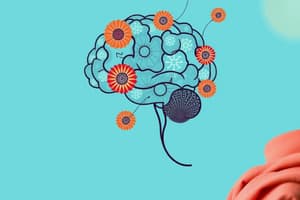Podcast
Questions and Answers
What does Behaviorism primarily focus on?
What does Behaviorism primarily focus on?
- Emotional responses
- Cognitive functions
- Observable behaviors (correct)
- Unconscious processes
Which principle is central to Humanistic Psychology?
Which principle is central to Humanistic Psychology?
- Reinforcement and punishment
- Unconscious motivations
- Self-actualization (correct)
- Conditioning based learning
What is a key concept in Gestalt Psychology?
What is a key concept in Gestalt Psychology?
- The structure of the mind
- Unconscious childhood experiences
- Conscious experiences shape behavior
- The whole is greater than the sum of its parts (correct)
Functionalism focuses on what aspect of psychology?
Functionalism focuses on what aspect of psychology?
Which method did Structuralism primarily use to study the mind?
Which method did Structuralism primarily use to study the mind?
What aspect does Psychoanalysis emphasize in understanding behavior?
What aspect does Psychoanalysis emphasize in understanding behavior?
Who is a notable figure associated with Humanistic Psychology?
Who is a notable figure associated with Humanistic Psychology?
Which school of thought critiques deterministic views found in Behaviorism?
Which school of thought critiques deterministic views found in Behaviorism?
Flashcards are hidden until you start studying
Study Notes
Schools of Thought in Psychology
1. Behaviorism
- Focuses on observable behaviors rather than internal mental states.
- Key figures: John B. Watson, B.F. Skinner.
- Principles:
- Learning is a result of conditioning.
- Emphasis on reinforcement and punishment.
- Behavior is shaped through interaction with the environment.
2. Humanistic Psychology
- Emphasizes individual potential and personal growth.
- Key figures: Carl Rogers, Abraham Maslow.
- Principles:
- Focus on self-actualization and fulfilling potential.
- Highlights subjective experiences and personal responsibility.
- Critiques deterministic views of behaviorism and psychoanalysis.
3. Gestalt Psychology
- Focuses on perception and how individuals organize visual elements into groups.
- Key figures: Max Wertheimer, Kurt Koffka, Wolfgang Köhler.
- Principles:
- "The whole is greater than the sum of its parts."
- Emphasizes holistic processing in perception.
- Study of patterns and context in understanding experiences.
4. Functionalism
- Focuses on the purpose of consciousness and behavior in adapting to the environment.
- Key figures: William James, John Dewey.
- Principles:
- Examines mental processes in a practical context.
- Influences applied psychology and educational practices.
- Studies how mental activities help organisms adapt.
5. Structuralism
- Aimed to break down mental processes into their simplest components.
- Key figures: Wilhelm Wundt, Edward Titchener.
- Principles:
- Utilized introspection to explore the structure of the mind.
- Focuses on the contents of consciousness (sensations, feelings, images).
- Considered a precursor to modern psychological methods.
6. Psychoanalysis
- Focuses on unconscious processes and childhood experiences.
- Key figures: Sigmund Freud.
- Principles:
- Emphasizes the role of the unconscious mind in behavior.
- Introduces concepts such as defense mechanisms and the id, ego, and superego.
- Uses free association and dream analysis as therapeutic techniques.
7. Humanistic Approach
- An extension of humanistic psychology with a focus on holistic aspects of human behavior.
- Principles:
- Emphasizes empathy, acceptance, and personal growth in therapy.
- Advocates for a client-centered approach in psychological practice.
- Aims to understand the individual's experience in a compassionate manner.
Behaviorism
- Concentrates on observable behaviors, dismissing internal cognitive processes.
- Key contributors include John B. Watson and B.F. Skinner.
- Learning occurs through conditioning with a strong focus on reinforcement and punishment.
- Behavior is shaped by environmental interactions.
Humanistic Psychology
- Prioritizes individual potential and personal growth in psychological understanding.
- Influential figures are Carl Rogers and Abraham Maslow.
- Promotes self-actualization and the pursuit of fulfilling one’s potential.
- Highlights the importance of subjective experiences and personal responsibility, opposing deterministic views from behaviorism and psychoanalysis.
Gestalt Psychology
- Investigates how individuals perceive visual elements as organized wholes.
- Foundational figures include Max Wertheimer, Kurt Koffka, and Wolfgang Köhler.
- Advocates the principle that "the whole is greater than the sum of its parts."
- Emphasizes holistic processing and studies patterns and context in perception.
Functionalism
- Examines the purpose of consciousness and behavior in aiding adaptation to the environment.
- William James and John Dewey are notable figures in this school of thought.
- Focuses on practical applications of mental processes in real-world contexts.
- Influenced the development of applied psychology and educational methods.
Structuralism
- Aims to deconstruct mental processes into their simplest elements.
- Wilhelm Wundt and Edward Titchener are key proponents of this approach.
- Utilizes introspection to explore the structures of consciousness.
- Explores sensations, feelings, and imagery, laying groundwork for contemporary psychological methods.
Psychoanalysis
- Investigates unconscious processes and the impact of childhood experiences on behavior.
- Sigmund Freud is the founding figure of psychoanalysis.
- Highlights the unconscious mind's role and introduces concepts like defense mechanisms alongside the id, ego, and superego.
- Employs techniques such as free association and dream analysis in therapeutic settings.
Humanistic Approach
- Builds upon humanistic psychology, focusing on the holistic nature of human behavior.
- Emphasizes empathy, acceptance, and personal growth within therapeutic relationships.
- Supports a client-centered approach, seeking to understand individual experiences compassionately.
Studying That Suits You
Use AI to generate personalized quizzes and flashcards to suit your learning preferences.




